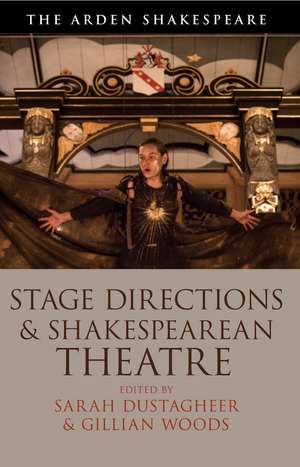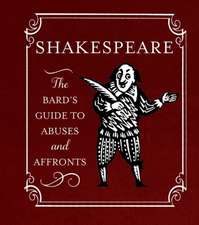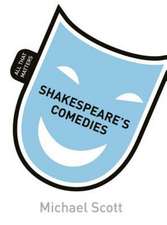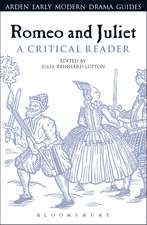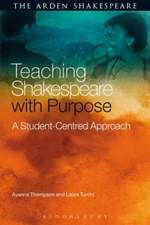Stage Directions and Shakespearean Theatre
Editat de Gillian Woods, Sarah Dustagheeren Limba Engleză Hardback – 13 dec 2017
| Toate formatele și edițiile | Preț | Express |
|---|---|---|
| Paperback (1) | 231.06 lei 6-8 săpt. | |
| Bloomsbury Publishing – 26 iun 2019 | 231.06 lei 6-8 săpt. | |
| Hardback (1) | 656.32 lei 6-8 săpt. | |
| Bloomsbury Publishing – 13 dec 2017 | 656.32 lei 6-8 săpt. |
Preț: 656.32 lei
Preț vechi: 943.02 lei
-30% Nou
Puncte Express: 984
Preț estimativ în valută:
125.61€ • 130.79$ • 106.15£
125.61€ • 130.79$ • 106.15£
Carte tipărită la comandă
Livrare economică 10-24 martie
Preluare comenzi: 021 569.72.76
Specificații
ISBN-13: 9781474257473
ISBN-10: 147425747X
Pagini: 368
Dimensiuni: 129 x 198 x 25 mm
Greutate: 0.49 kg
Editura: Bloomsbury Publishing
Colecția The Arden Shakespeare
Locul publicării:London, United Kingdom
ISBN-10: 147425747X
Pagini: 368
Dimensiuni: 129 x 198 x 25 mm
Greutate: 0.49 kg
Editura: Bloomsbury Publishing
Colecția The Arden Shakespeare
Locul publicării:London, United Kingdom
Caracteristici
Offers readers a rich and dynamic perspective on stage directions by bringing together a mixture of theatre historians, editors, and performance-studies and literary scholars
Notă biografică
Sarah Dustagheer is Lecturer in Early Modern Literature at the University of Kent, UK.Gillian Woods is Lecturer in Renaissance Literature and Theatre at Birkbeck College, University of London, UK.
Cuprins
Acknowledgements; Note on the Text; List of Contributors;Introduction;Part One: Taxonomy1. Inventing Stage Directions;Demoting Dumb Shows by Tiffany Stern, Royal Holloway, University of London, UK.2. The Boundaries of Stage Directions by Laurie Maguire, Oxford University, UK.3. Peter falls into the hole': Nonce Stage Directions and the Idea of the Dictionary by Paul Menzer, Mary Baldwin University, USA; and Jess Hamlet, University of Alabama, USA. Part Two: Text4. Reading Shakespeare's Stage Directions by Emma Smith, Hertford College, Oxford, UK.5. Shakespeare's Literary Stage Directions by Douglas Bruster, University of Texas, USA.Part Three: Editing6. When is a Missing Stage Direction Missing? Suzanne Gossett;7. Editing and Directing: Mise en scene, mise en page by Terri Bourus, Florida State University, USA.Part Four: Space8. 'By indirections find directions out': Unpicking Early Modern Stage Directions by Martin White, University of Bristol, UK.9. 'Strikes open a curtain where appears a body': Discovering Death in Stage Directions by Sarah Dustagheer, University of Kent, UK; with Philip Bird, actor, director and playwright, UK.Part Five: Plays 10. Enter Macduffe, with Macbeths head': Shakespeare's Macbeth and the Staging of Trauma by Andrew Hiscock, Bangor University, UK.11. '(From the Dutchesse Grave)': Echoic Liminalities in The Duchess of Malfi by Sarah Lewis, King's College London, UK.12. Understanding Dumb Shows and Interpreting The White Devil by Gillian Woods, Birkbeck College, University of London, UK.Notes; Critical Bibliography; Index;
Recenzii
A collection that puts under new scrutiny the textual expression of the early modern theater's original practices. Essays do an admirable job of estranging an overfamiliar form.
The essays in this collection provide a foundation for the 'rethinking' of stage directions promised by the editors' introduction ... The variety of viewpoints and methodologies offered here ultimately attests to the evolving nature of the conversation around the function of stage directions in early modern plays.
The essays in this collection provide a foundation for the 'rethinking' of stage directions promised by the editors' introduction ... The variety of viewpoints and methodologies offered here ultimately attests to the evolving nature of the conversation around the function of stage directions in early modern plays.
